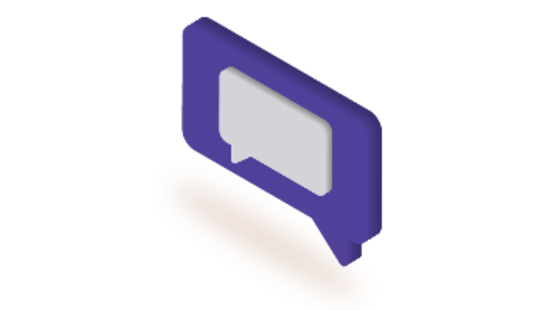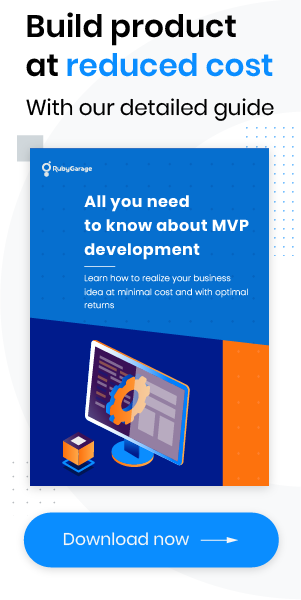-
Product Management
Software Testing
Technology Consulting
-
Multi-Vendor Marketplace
Online StoreCreate an online store with unique design and features at minimal cost using our MarketAge solutionCustom MarketplaceGet a unique, scalable, and cost-effective online marketplace with minimum time to marketTelemedicine SoftwareGet a cost-efficient, HIPAA-compliant telemedicine solution tailored to your facility's requirementsChat AppGet a customizable chat solution to connect users across multiple apps and platformsCustom Booking SystemImprove your business operations and expand to new markets with our appointment booking solutionVideo ConferencingAdjust our video conferencing solution for your business needsFor EnterpriseScale, automate, and improve business processes in your enterprise with our custom software solutionsFor StartupsTurn your startup ideas into viable, value-driven, and commercially successful software solutions -
-
- Case Studies
- Blog
How to Create Messaging App Like WhatsApp
After the rapid growth of social networks in 2018, we caught ourselves wondering What is the state of messaging apps today?The good news is that messengers are more popular than ever. Users communicate via messengers not only with friends and relatives but enhance their businesses as well. It’s become a key method of communication with customers. This fact has contributed to the renewed popularity and accelerated the growth of messengers. WhatsApp takes first place among the most popular apps making entrepreneurs look for ways to create a messaging app like WhatsApp.

A modern chat app must possess noteworthy functionalities that can be adapted to any type of chat solution. An ideal chat app has the potential of offering solutions for enterprise-level communication, customer-focused business communication, e-commerce chat, and personal chat.
Now it’s time to roll up our sleeves and get down to business developing a stupendous chat app like WhatsApp.
1. What features are a must in a messaging app like WhatsApp?
Before starting to develop a messaging app, let’s talk about the essential features of a WhatsApp-like application.
Registration page and contact integration
Authentication in chat apps can be implemented in various ways: via phone number, email, or social media profiles. Most instant messaging apps require users to sign in with a phone number. WhatsApp sends an SMS confirmation code for security reasons. After registering, users can create their own profiles where they can add personal information and a profile photo.
The next step is to import contacts from the address book, as there’s no fun in a chat app when you have no one to chat with. Make sure this step is quick and convenient. The more friends that users have in a chat app, the greater the chance that they’ll use it.
Profile customization
Customizing profiles helps users express their individuality. They might change names and nicknames, background colors, patterns, and fonts, or choose an avatar photo from the camera roll or by taking a photo instantly. In a lot of apps, people can see user status, namely when people last used the messenger app, who’s online, and when someone is typing.
Messaging
Instant messaging feature operates over the internet, but if users go offline they can receive all the messages they miss as soon as they get back online. Also, messages can have statuses (delivered/failed/seen/edited). This is now a standard feature in most chat applications, letting users know the status of their messages from the moment they’re sent until they’re read by the recipient.
Because all chat apps have this instant messaging feature, so to make an app stand out consider offering both private and public chats. A group chat option lets users create a group and chat with multiple people at the same time, invite new people to the group, choose specific members within a group, i.e. create a sub-group to send a picture to.
It’s evident that your messaging app needs to send messages to users. But it’s also expected to store conversation history. For messengers, this means that chat histories and files sent by users should be stored in the cloud so they can be accessed anytime from any device. This is a great feature for people who use multiple devices on a single messenger account, those who have lost their phones, or those who have accidentally deleted the chat app.
Quick search is a feature that makes it easy for users to search and track conversations that took place long ago. Or users can search for their friends, media files, GIFs, and so on.
Another feature to implement is voice messaging. This is a feature in which text messages are transmitted via voice media. Users can leave a message for friends at any time without needing to type everything out.
Video and voice calls
Video and voice calling make a chat app more interactive, putting no limits on the way users can interact and communicate with each other. Here are the main voice and video options an app can provide:
Voice calling. Voice calling lets users call their contacts for free, even if they’re in another country. With voice calling, users can speak but they can’t see each other.
Video calling. Video calling offers visual communication between users. A video call uses an internet connection and Voice over Internet Protocol (VoIP), which includes video of the person making the call. This feature makes it easy to connect with friends and family even when they’re far apart.
Group calls. Chat apps can also allow users to hold group conversations with both audio and video.
Media file transmission
Apart from emojis and texts, people love to share other types of media such as photos, stickers, and GIFs. Sometimes, one quick picture says it all, especially in a real-time chat app. Stickers are also among the top monetization options for a messaging app.
Push notifications
Notifications should be implemented in an app while developing the MVP. They serve as a the direct line of communication between the messenger and its users. These handy messages keep users active within the app and inform them when new messages have arrived or someone comes online.
2. Extra features that help an app stand against the established brands
A messaging app should be able to send and receive messages – that’s a no-brainer. But sometimes only one exclusive feature can lead a mobile app to success. That’s exactly what happened with Snapchat, which allows users to share images or videos that can only be viewed for a matter of seconds.
Here’s a quick checklist of additional messaging app features to consider when building an instant messaging app like WhatsApp:
- Customizable profiles (background colors, patterns, fonts)
- Secret secure chats with messages that self-destruct on both devices within a specified time after being read
- Scheduling messages in advance (e.g. for birthdays and holidays)
- Location sharing
- Stickers (let users create their own stickers)
- Temporary content like statuses and stories
- Games (provide more fun)
- Ecommerce features (for example, chatbots)
- Exclusive content in collaboration with influencers (like KIK)
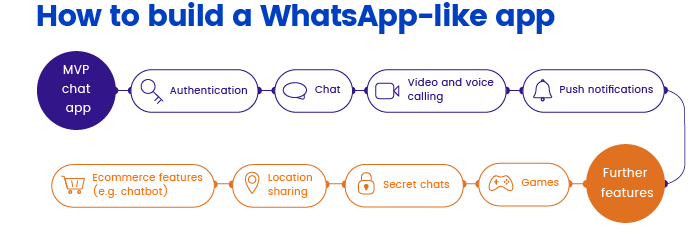
3. Technology stack for an app like WhatsApp
So how can you create a chat app like WhatsApp? Start by understanding the tech stack that you’ll need.
Authentication
Recognizing users is vital for any mobile app. Any messaging app should include authentication to protect users from fraud and spam. Usually, this is done through a third-party API. If authentication in your chat app will be implemented via phone numbers, you can use the Nexmo API, which offers an easy way of adding a layer of protection by using a phone number to authenticate new and existing customers. If your chat app will support authentication with email addresses or social media accounts, you can use tools such as the Facebook SDK and Twitter Kit.
Chatting
A chat app means ongoing messages. To process hundreds of thousands of messages instantly with little to no delay, use a WebSocket. WebSockets let you establish a solid connection between the mobile app and the server. WebSockets send data directly, providing fast and persistent communication between the server and mobile app.
User data storage
A chat app contains a lot of user data including text messages, files, and images. To store all this user data, you need to set up backend logic. This part of development involves databases like PostgreSQL, file storage services like Amazon S3, and web servers like NGinx.
Notifications
Notifications are essential for retaining your users and keeping them active in the app. For Android chat app development, you can use Firebase Cloud Messaging, and for an iOS messaging app you can use either Firebase or Apple Push Notifications, which is native to the iOS platform.
Video and voice calls
To let users communicate more interactively, implement voice and video calling. To make this possible, you can use technology like Voice over Internet Protocol (VOIP). VoIP is enabled by a group of technologies and methodologies used to deliver voice communications and multimedia sessions over the internet.
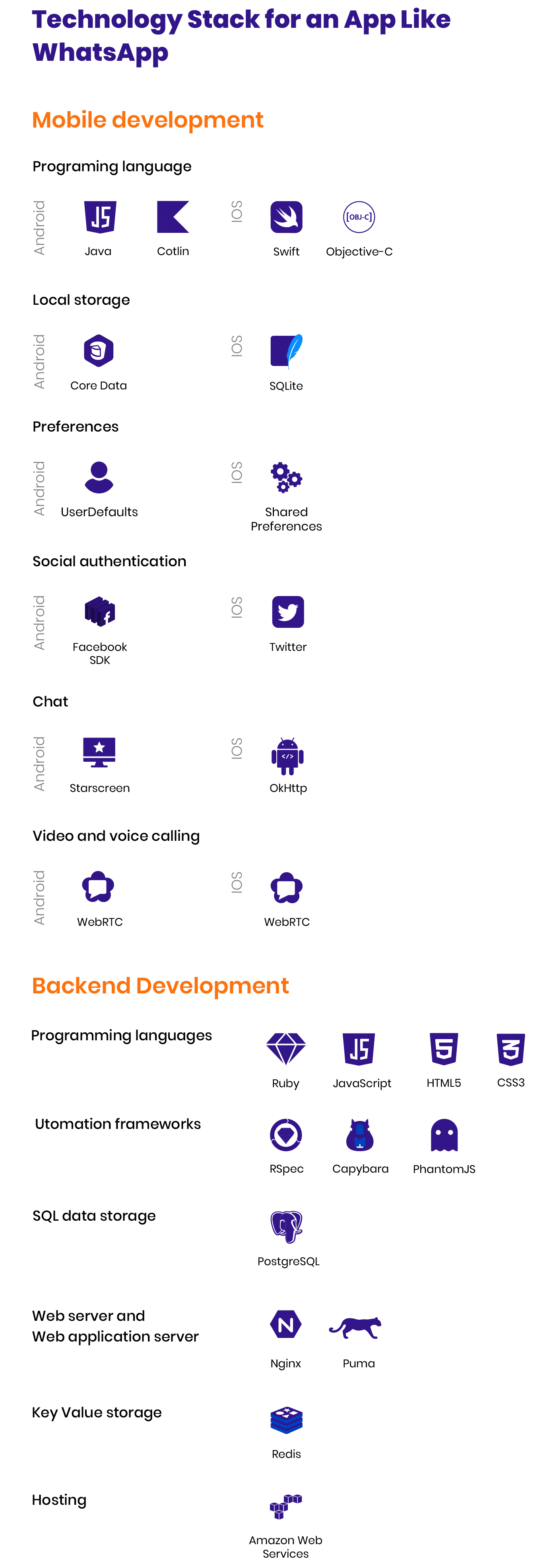
4. How to make money with a WhatsApp-like app
Let’s look at how to generate revenue with a messaging app. We can learn a lot from the market leaders.
Subscription fees
With a subscription fee, a customer must pay to access an app. Initially, WhatsApp’s single method of monetization was a subscription fee. The app used to cost $0.99 per year after a one-year free trial period. Subscriptions can bring substantial revenue if the user base is large enough. Nowadays, most messenger apps are free, however, and subscription fees may be a barrier preventing plenty of people from using an app.
Advertising
In-app advertising is a good way of earning money from an app. This approach works well because it provides a better solution to capture consumers’ attention. For example, Viber shows targeted messages and ads. But frequently, users prefer their messengers without invasive ads. So advertising might make a few dollars, but it’s likely to annoy your users. Alternatively, you can offer to disable advertising at a cost.
Built-in ads are one more way of advertising. For example, Snapchat provides a self-serve ad tool called Snapchat Ad Manager. Snap Ads are full-screen vertical video ads that can be up to 10 seconds long. Ads appear in between friends’ stories and Snapchat curated content such as Snapchat stories and publishers’ stories. This monetization approach is effective enough because it offers a good advertising channel for marketers and reaches an active user base since a great number of people use the app daily.
In-app purchases
If people want some extra features, you can ask them to pay. Paid stickers are one of the main sources of revenue for a great number of messengers. This strategy is a win-win for users and entrepreneurs, so it’s worth a try.
In addition to stickers, messengers can sell other customization options such as wallpapers, themes, and filters.
Games are a major revenue source for messengers like LINE. In LINE, users can play video games directly in chat threads. Revenue is provided by in-app purchases of in-game currency, experience, or items.
Sponsorship
Sponsorship entails partnering with advertisers who provide users with rewards for completing certain in-app actions. With this monetization approach, advertisers gain inclusion in the app by funding rewards for users, who earn these rewards by engaging more with the app. The app earns money by taking a share of the revenue from redeemed rewards. For instance, branded stickers can be used by companies to promote their products such as upcoming movies or new foods.
This monetization strategy will likely be better received than which other strategies by users due to its relevance, as it’s related to the app’s main purpose.

5. What are the challenges of building an app like WhatsApp?
Now that we’ve identified all the required features for a chat app, let’s look at challenges you can face while building a messaging app.
Retaining and engaging users
User engagement and user retention are two metrics that provide genuine insight into the success of a mobile application. Today, mobile app users don’t give many chances, so you should attract them from the start.
App developers are up against a competitive market in which users have a lot of choices. To stand out, your app must be engaging enough to appeal to the target audience. Develop a user-friendly and technically advanced app; otherwise, people will forget about it.
Here are some practical tips that help produce results:
- Onboarding experience. First impressions are imperative, and the user experience is no exception. Providing a seamless onboarding experience can significantly reduce abandonment rates.
- Personalization. This is arguably one of the most important aspects of a compelling application. Personalization provides a more unique, relevant experience to users. The more aligned the experience is with a user’s needs, the more likely they are to continue using the app.
- Incentives. If you want to drive engagement and retention, offering users incentives to use an app can go a long way. Mobile-specific rewards, special promotions, access to specialized content, and other offers can help drive conversions and encourage engagement.
- Regular updates. Regularly updating the app experience with new features and personalized content helps keep users interested and engaged. It’s important to monitor analytics, track user behavior, and consider feedback to establish what app features drive usage.
Security issues
Security is one of the main challenges you can face while building a messaging app. Today, a lot of people are looking for a more secure way to communicate. Users are worried about security, and a lack of encryption won’t lead an app to success. Encryption is desired by many organizations and users that simply don’t want to have proprietary or personal information transmitted over the internet in the clear. Let’s take a look at specific examples and see how popular messengers put security and privacy into their apps.
WhatsApp implemented security features by making a deal with Open Whisper Systems to develop an end-to-end encryption system. Now, no third party including WhatsApp itself can decipher the content of your messages.
In contrast to the majority of apps, Telegram uses an in-house non open–source encryption protocol. Secure messengers have to ensure that if one of your messages is intercepted and deciphered it won’t be impossible to hack all of your other messages. Telegram does this by changing cryptographic keys every week or after a certain number of messages are sent.
Handling ubiquity
User expectations are growing and users are becoming more demanding every day. Now, users expect messenger apps to function as a tool for everything, just like WeChat does. WeChat is a great example of a messenger app that offers just about everything, from text messaging to instant payments. The messenger’s success has been powered by the platform's mobile payment service, WeChat Pay, which assists with every aspect of life – from shopping for clothes and hailing taxis to organizing doctor’s appointments and ordering food delivery. The messenger even lets you pay the electric bill or traffic fines.
Facebook Messenger is another example of how a messaging app can do a whole lot more than just send texts. In addition to text, photo, and video functionality, Messenger lets users send money and play games without downloading another app or visiting a website. The main Messenger advantage is its use as an ultimate customer support tool with chatbots.
The Messenger app includes an API to build chatbots to interact with users. Bots automatically engage with messages. They can be programmed to respond the same way each time, to respond based on keywords, and even to use machine learning to adapt their responses to fit the situation.

6. How long does it take to develop a chat app like WhatsApp?
The time it takes to develop a messenger app like WhatsApp depends on many factors, including the number of features and the difficulty of the project. If you want to create an app quickly, we recommend starting with something simple and small. For example, you can build an MVP first. Take a look at our rough estimate for a chat app MVP.
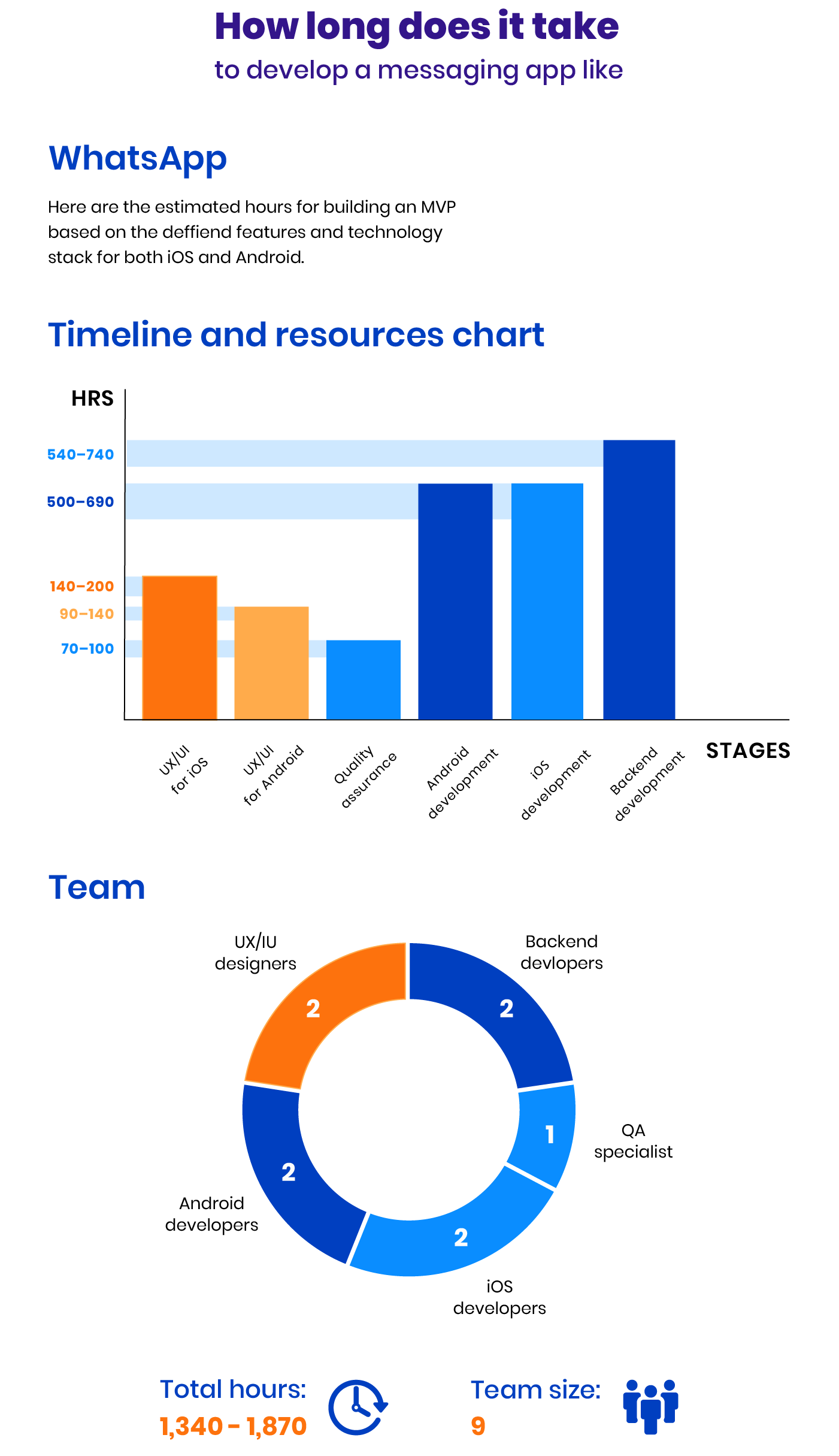
Wrapping up
The messaging app market demonstrates continuous evolution, and there’s still a chance to build a WhatsApp-like app that will get a decent market share.
In many ways, messaging applications represent the future of communication. They allow users from all over the world to remain in contact for free. Real-time chat apps beat SMS and are already on their way to overtaking phone calls thanks to VoIP features.




